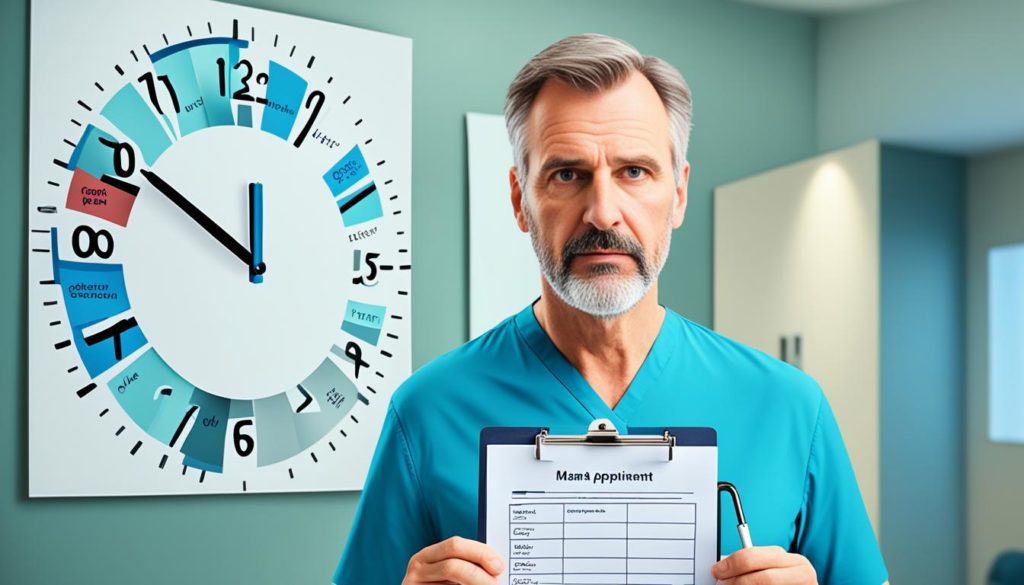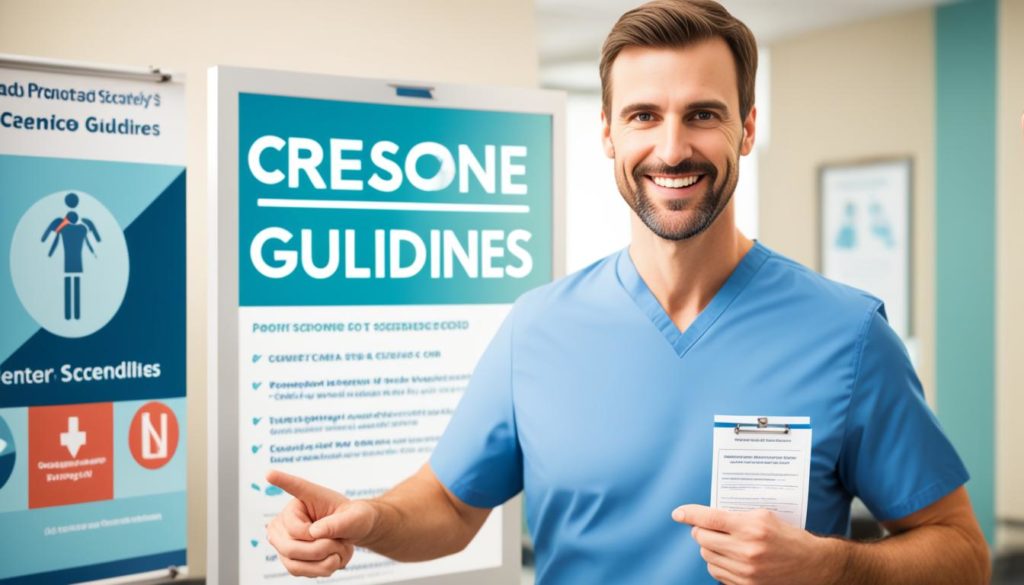Did you know that one in nine men will be diagnosed with prostate cancer in their lifetime? This fact shows how important it is to manage prostate cancer well. Making the most of each doctor’s visit is key for the best care. By improving communication with doctors, being ready for appointments, and taking an active role in treatment, patients can get better health results.
Key Takeaways
- Prostate cancer affects one in nine men, underscoring the need for proactive management.
- Effective prostate cancer management starts with optimizing doctor visits.
- Patient-doctor communication is crucial for improved health outcomes.
- Preparation for appointments can lead to more productive visits.
- Active participation in the treatment process is essential for effective prostate cancer care.
Preparing for Your Prostate Cancer Doctor Visit
Getting ready for your doctor’s visit is key to getting the most out of it. This means gathering important records, listing symptoms, and knowing your personal medical history and family background.

Gathering Medical Records and Information
Having your medical records ready helps your doctor understand your situation better. It’s a crucial part of getting ready for your visit.
- Bring copies of previous medical records, including any imaging results.
- Include lab test results that pertain to your personal medical history.
- Prepare a list of medications and supplements you are currently taking.
Creating a List of Symptoms and Concerns
Writing down your symptoms and health worries can help you talk better with your doctor. It’s a big part of getting ready.
- Note the onset and frequency of any discomfort or unusual symptoms.
- Detail how these symptoms affect your daily life and activities.
- Prepare questions or concerns you have regarding your prostate health.
Understanding Your Family Medical History
Knowing your family’s health history is important for understanding your risks. It makes your doctor’s visit more effective.
- Discuss prostate cancer or other cancers in your family.
- Record any chronic illnesses prevalent among close relatives.
- Examine patterns of health conditions within your family tree.
By preparing well and following these steps, you can make the most of your visit. You’ll have a better and more useful talk with your healthcare provider.
| Step | Description | Importance |
|---|---|---|
| Gather Records | Amassing past medical records and current medications | Provides a complete health history to your doctor |
| List Symptoms | Detailing symptoms and their impact on life | Facilitates focused and efficient consultations |
| Know Family History | Understanding genetic risks and background | Influences risk assessment and action plan |
Importance of Prostate Cancer Screening
Knowing how crucial prostate cancer screening is key to catching the disease early. Regular tests can help find it early, making treatment more effective.

Types of Screening Tests
There are many tests to find prostate cancer, each with its own benefits:
- PSA Testing: This test checks the prostate-specific antigen (PSA) in blood. High PSA levels might mean prostate cancer, so more tests are needed.
- Digital Rectal Exam (DRE): A healthcare professional feels the prostate gland during a DRE to look for any odd shapes or sizes.
When and How Often to Get Screened
How often and when to get screened depends on your age, family history, and health. Following prostate cancer screening guidelines is key:
- Men over 50 should get PSA tests every year.
- Those with a family history of prostate cancer should start testing at 40-45.
Interpreting Screening Results
It’s vital to understand prostate cancer screening results. High PSA levels don’t always mean cancer. More tests, like biopsies, might be needed. Talking to a healthcare professional is important to figure out what to do next. Finding prostate cancer early means it can be treated sooner, which helps with recovery and survival chances.
Questions to Ask Your Prostate Cancer Specialist
Asking informed questions can greatly help you in your prostate cancer treatment journey. When you talk to your specialist, here are key questions to ask. They will help you make confident decisions:
- What are my prostate cancer treatment options? This question is key to understanding the different ways to treat it, like surgery, radiation, or watching and waiting.
- What are the potential side effects of each treatment? Knowing the side effects helps you see the good and bad of each choice.
- How will the treatment impact my daily life? Understanding how treatment might change your life helps you plan and set realistic expectations.
- What is the success rate of the suggested treatments? Knowing how well treatments work can help you choose wisely.
- Are there any clinical trials available for my condition? Asking about trials might show you new, advanced treatment options.
- How long will the treatment process take? Knowing the treatment timeline helps you get ready for what’s ahead.
- What is the follow-up care like after treatment? Asking about aftercare makes sure you’re ready for the ongoing care needed after treatment.
Talking with your specialist helps you understand your treatment options for prostate cancer. By asking these questions, you can move through your treatment with clear goals and confidence.
“Insightful questions lead to informed decisions, transforming the patient experience during prostate cancer treatment.”
Navigating the Prostate Cancer Clinic Experience
When you visit a prostate cancer clinic, it’s key to know about the prostate cancer care team. You should also understand what to expect from your appointments and how to work well with your care team. This helps make your experience better.
Who You Will Meet: The Prostate Cancer Care Team
You’ll meet a team of experts at the clinic. This team includes oncologists, urologists, radiologists, and nurses. They all have different skills to help you. You might also meet dietitians, physical therapists, and social workers who offer support during your treatment.
What to Expect During the Appointment
Expect detailed medical checks and talks about your health and treatment plans during your appointment. The team will look over your medical history, do tests, and share results and advice. Knowing what to expect makes working with your care team smoother and more helpful.
How to Make the Most of Your Time
Arriving ready with questions and concerns is a good idea. Talking openly about symptoms, treatment effects, and lifestyle changes helps your team work better together. Being active in your appointments helps match your health goals with the clinic’s care, leading to better health.
Explore Prostate Cancer Treatment Options
It’s important to know about prostate cancer therapies to make good choices. This guide covers surgical treatment, radiation therapy, and hormonal therapies. We’ll look at the good and bad sides of each to help you decide.
Surgical Treatments
Surgery is often used for early-stage prostate cancer. The most common surgery is radical prostatectomy, where the prostate gland is removed. This surgery can effectively remove cancer but may cause issues like urinary incontinence and erectile dysfunction.
Thanks to robotic-assisted surgery, recovery is faster and more precise. This makes it a top choice for many prostate cancer treatments.
Radiation Therapy
Radiation therapy uses high-energy rays to kill cancer cells. It’s a good option for those not suited for surgery. There are two main types: external beam radiation therapy (EBRT) and brachytherapy.
EBRT sends radiation from outside the body to the tumor. Brachytherapy places radioactive seeds inside the prostate. Both can cause side effects like fatigue, bowel problems, and urinary issues. But, new radiation methods are making treatment better and safer.
Hormonal Therapy
Hormonal therapy lowers male hormones that help prostate cancer grow. It’s often used with other treatments. Options include androgen deprivation therapy (ADT) and anti-androgens.
This therapy can slow cancer growth but may cause side effects like hot flashes, low libido, and bone thinning. Researchers are working to lessen these effects and improve hormonal therapy.
The Role of the Prostate Cancer Health Center
Prostate health centers are key in giving men comprehensive care suited to their needs. They have a wide array of prostate cancer resources. These resources help with early detection, treatment, and ongoing support.
At places like the Mayo Clinic, patients get care from a team of experts. This team includes urologists, oncologists, and others. They work together to give patients the best care possible. The Mayo Clinic is known for its high quality, making it a top choice for care.
- Personalized care plans
- Advanced diagnostic and treatment technologies
- Access to clinical trials and new therapies
- Psychological and emotional support services
- Comprehensive cancer education and preventive strategies
Choosing a center like Mayo Clinic means getting top-notch medical care. You also get support and resources to help manage your health.
When looking at prostate health centers, consider these factors:
| Factor | Why It Matters |
|---|---|
| Expertise and Experience | Ensures high-quality, evidence-based care |
| Comprehensive Services | Provides all necessary treatments and supports under one roof |
| Advanced Technology | Facilitates precise diagnosis and effective treatments |
| Patient Education Resources | Empowers patients to make informed decisions |
The right prostate cancer health center is vital for a patient’s care journey. It offers key prostate cancer resources and comprehensive care. This ensures the best outcomes and quality of life.
Optimize Prostate Cancer Doctor Visits
Making the most of your prostate cancer doctor visits can really help your treatment. This part talks about how to talk better with your doctor, keeping track of your treatment, and the value of second opinions. This ensures you get the best care possible.
Communication Tips
Talking well with your doctor is key when you have prostate cancer. Here are some tips:
- Prepare a list of questions and concerns before your visit.
- Be honest and open about your symptoms and any side effects.
- Ask for clarification if you don’t understand medical jargon.
- Take notes during your appointment to remember key points.
Tracking Progress and Follow-ups
It’s important to watch your treatment progress closely. Here’s how to do it:
- Maintain a journal of your symptoms and any changes over time.
- Schedule regular follow-up appointments for continuous evaluation.
- Use apps or digital tools specially designed for treatment progress tracking.
- Discuss all changes and progress with your healthcare provider.
Utilizing a Second Opinion
The value of second opinions in prostate cancer treatment is huge. Here’s why:
| Benefits of Seeking a Second Opinion | Details |
|---|---|
| Confirmation of Diagnosis | A second opinion can verify the accuracy of your initial diagnosis. |
| Exploration of Treatment Options | Learn about alternative treatment plans that might be more suitable. |
| Peace of Mind | Offers reassurance and confidence in your treatment decisions. |
| Access to Specialists | Provides an opportunity to consult with different experts in the field. |
Support Services During Prostate Cancer Treatment
Prostate cancer support services help patients in many ways during their treatment. They focus on keeping the whole person healthy and happy.
Emotional and Psychological Support
Emotional well-being is key for prostate cancer patients. Experts like psychologists, counselors, and support groups offer a safe place to talk. They help deal with fears and stress, making mental health better.
Nutrition and Diet Advice
Eating right is vital for those going through treatment. Nutrition counseling gives patients the right foods for their health. Experts suggest diets that help with emotional well-being and keep the immune system strong.
Physical Therapy and Rehabilitation
Staying physically healthy is important during prostate cancer treatment. Nutrition and physical rehabilitation services offer exercises suited to each person. This helps with better movement and strength. Physical therapy also helps regain lost strength and improve life quality.
Understanding Prostate Cancer Check-up Services
After treatment for prostate cancer, regular check-ups are key. These visits help keep an eye on the cancer coming back, manage health issues, and check for new symptoms. Talking with your doctor during these visits is important. It helps catch problems early and talk about ways to stay healthy.
Check-ups often include physical exams, PSA tests, and scans like MRIs or CT scans. These tests help your doctors see how you’re doing and catch any signs of cancer coming back early. They also help manage side effects like trouble with urination or sex life.
Talking openly with your doctor during check-ups is crucial. Tell them about any new symptoms or worries you have. Don’t be shy to ask questions about your recovery. Regular visits help spot problems early and keep you healthy, letting you live well after treatment. Being active in your follow-up care is key to a good outcome and well-being.
FAQ
Why is effective patient-doctor communication important in prostate cancer care?
Good communication makes sure both the patient and doctor understand each other. This leads to better treatment plans, catching problems early, and more tailored care.
How should I prepare for a prostate cancer doctor visit?
Collect all your medical records and health info. Make a list of symptoms and concerns. Knowing your family’s health history can also help your doctor.
What are the various types of prostate cancer screening tests available?
Tests for prostate cancer include the PSA test and the DRE. Your doctor might suggest more tests based on your health and risk factors.
How often should I undergo prostate cancer screening?
How often you need screenings depends on your health and risk factors. Men over 50 should talk to their doctor about when and how often to get screened.
What should I ask my prostate cancer specialist during consultations?
Ask about treatment options, side effects, how the disease affects your life, and the future outlook. This helps you make informed choices and understand your treatment.
Who are the members of a typical prostate cancer care team?
The team includes urologists, oncologists, radiologists, nurses, and support staff. Each member is key to giving you full care.
What can I expect during an appointment at a prostate cancer clinic?
You might get physical exams, screenings, and talk about treatment options. Being ready with questions and health info makes these visits better.
What are the primary treatment options for prostate cancer?
Options include surgery, radiation, and hormone treatments. Each has its pros and cons, and the best choice depends on your health and condition.
How do prostate cancer health centers support patients?
These centers offer full care, including diagnosis, treatment, and support. They have resources for all aspects of prostate cancer care, helping patients get complete support.
What strategies can optimize prostate cancer doctor visits?
Good communication, tracking your treatment, and getting second opinions when needed make visits better. These steps keep you involved and informed in your care.
What support services are available during prostate cancer treatment?
Services include counseling, nutrition advice, and physical therapy. They focus on your overall health, not just the disease.
What are prostate cancer check-up services post-treatment?
After treatment, you’ll have regular check-ups, screenings for recurrence, and care for any side effects or health issues that come up.


